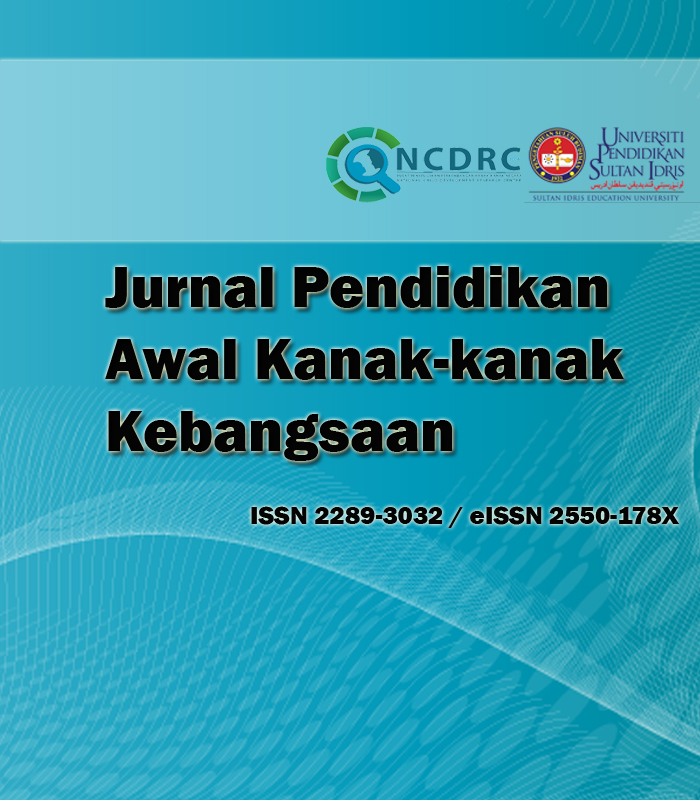Need analysis for the development of pretend play module to promote children's social communication skills
Analisis Keperluan Pembinaan Modul Bermain Olok-olok untuk Menggalakkan Kemahiran Komunikasi Sosial Kanak-kanak
DOI:
https://doi.org/10.37134/jpak.vol12.1.4.2023Keywords:
Module, Pretend Play, Social Communication, Children, KindergartenAbstract
A needs analysis was conducted to determine the needs for development of a pretend play module to promote children's social communication skills. There are several aspects that evaluated for the development of a pretend play module, including the needs of pretend play module, teacher’s knowledge and practice regarding pretend play, as well as the module’s elements needed by the teachers. This study used a quantitative approach where a questionnaire was used as a research instrument. This study involved 30 teachers from private kindergarten around the state of Perak. The data was analyzed descriptively using Statistical Package For The Social Science Version 26 (SPSS 26). The findings of the study showed that there is a need for the development of a pretend play module for promoting children’s social communication. Therefore, it is hoped that the development of this module can help teachers in promoting children's social communication skills.
Downloads
References
Ali, A., Nor Puteh, S., & Mahamod, Z. (2018). Isu dan Kekangan Melaksanakan Pendekatan Belajar Melalui Bermain dalam Pengajaran Bahasa bagi Kanak-kanak Prasekolah.
Almon, J., & Miller, E. (2012). The Crisis in Early Education: A Research-based Case for More Play and Less Pressure. Dimuat turun daripada http://www.habitot.org/museum/pdf/play_research/Crisis_EarlyEd.pdf
Fitri, D. P. (2018). Membangun Softskill Anak Usia Dini melalui Pretend Play. ThufuLA: Jurnal Inovasi Pendidikan Guru Raudhatul Athfal, 6(2), 351-373.
Jantan, R. (2013). Faedah bermain dalam perkembangan kanak-kanak prasekolah (4-6 tahun). Dlm. Mahizer Hamzah.(pngr.). Trend dan isu: Pengajaran dan pembelajaran (hlm. 59-69). Tanjung Malim: Universiti Pendidikan Sultan Idris
Kementerian Pendidikan Malaysia. 2017. Buku Penerangan Kurikulum Standard Prasekolah Kebangsaan (Semakan 2017). Putrajaya: Bahagian Pembangunan Kurikulum, Kementerian Pendidikan Malaysia
Lederer, S. H. (2002). Collaborative pretend play: From theory to therapy. Child Language Teaching and Therapy, 18(3), 233–255. https://doi.org/10.1191/0265659002ct237oa
Lillard, .A.S. & Witherington, D. C. (2004). Mother Behavior Moditifications During Pretense and Their Possible Signal Value for Todlers. Developmental Psychology, 40,1,95-113. The American Psychological Associate.
Mohamad Ashari, Zakiah and Mohd. Kosnin, Azlina and Yeo, Kee Jiar (2013) The effectiveness of Learning Through Play Module on the understanding of number concept among preschool children. Journal of Education and Practice .
Mohamed Norok, N. and Khairuddin, K. F. (2022) “Tahap Kesediaan Guru Terhadap Penggunaan Kaedah Bermain Sambil Belajar Bagi Murid Berkeperluan Khas Pembelajaran”, Malaysian Journal of Social Sciences and Humanities (MJSSH), 7(1), pp. 132 - 144. doi: 10.47405/mjssh.v7i1.1246.
Moyles, J. (2005). The excellence of play. New York, NY: Open University Press
Nordin, N. S., & Rabi, N. M. (2020). Identifying the Social Communication Deficits among Students with Learning Disabilities in Primary School. International Journal of Academic Research in Business and Social Sciences, 10(3), 576–588.
Saedah Siraj, Norlidah Alias, Dorothy DeWitt, & Zaharah Hussin. (2013). Design and developmental research: Emergent trends in educational research. Kuala Lumpur: Pearson Malaysia.
Tee, Q. Y., & Md Nor, M. (2018). Exploring issues on teaching and learning in Malaysian private preschools.
Malaysian Online Journal of Educational Management (MOJEM), 6(2), 7-82. https://doi.org/10.22452/moQin,
Saturia bt Amiruddin, Agnis Sombuling, & Peter Voo Sui Kiong (2014), Penilaian Kesediaan Ke Sekolah Kanak- Kanak Dan Pengaruhnya Terhadap Penyesuaian di Sekolah, Seminar Kebangsaan, Integriti Keluarga (11 Disember 2014).
Vygotsky, L. S. (1978). The role of play in development. In M. Cole, V. John-Steiner, S. Scribner, & E. Souberman (Eds.), Mind in society: The development of higher psychological processes, 92-104. Cambridge, MA: Harvard University Press.
Downloads
Published
How to Cite
Issue
Section
License
Copyright (c) 2023 Nur Iman Aishah Azhar, Iylia Dayana Shamsudin

This work is licensed under a Creative Commons Attribution-NonCommercial-ShareAlike 4.0 International License.





